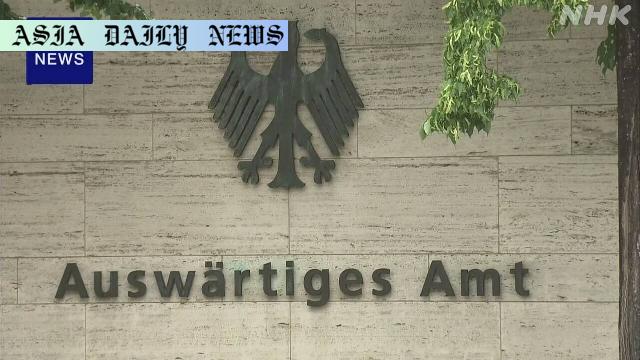Germany-China Tensions: Germany protests to China over laser targeting of German military reconnaissance aircraft.
Germany lodged an official protest to China over a laser targeting incident involving a German reconnaissance aircraft.
The aircraft was on an EU mission to protect ships from Yemen’s Houthi rebels when a Chinese warship allegedly targeted it.
The German foreign minister summoned the Chinese ambassador to protest and demand clarity on the matter.
China dismissed Germany’s claims, urging communication to resolve misunderstandings and misjudgment.

Background of the Incident
Germany recently lodged a formal protest to China following an alleged laser targeting incident involving a German reconnaissance aircraft over the Red Sea. According to German officials, the aircraft, which was chartered by the German military, was engaged in an EU-led mission designed to safeguard maritime security against threats from Yemen’s Houthi rebels. German authorities deemed the action by a Chinese warship as an act of endangerment, causing both operational disruption and a potential risk to personnel safety.
Germany’s Reaction and Diplomatic Measures
In response to the incident, Germany’s foreign ministry escalated the matter by summoning the Chinese ambassador to Germany to formally express discontent and demand accountability. German Foreign Minister Johann Wadephul stated the country’s willingness to maintain cooperative ties with China but emphasized that rule violations and provocative actions would face firm rejection. This diplomatic positioning indicates that while Germany desires constructive interaction with China, it is unafraid to take a strong stance against behavior it perceives as aggressive or non-compliant with international norms.
China’s Denial and Call for Dialogue
Meanwhile, China firmly rejected Germany’s claims, stating that the incident, as described by Germany, did not align with the facts perceived by Chinese authorities. The spokesperson from China’s Foreign Ministry urged both sides to adopt a fact-based approach to prevent misunderstandings or misjudgments. This statement highlights China’s preference for promoting dialogue and de-escalation while maintaining its stance of innocence in the altercation.
Global Implications and Strategic Context
This incident is an example of the rising geopolitical tensions in international waterways, particularly involving major powers with competing strategic interests. The Red Sea, as a critical shipping lane linking Europe to the Indian Ocean, holds significant importance for trade and military presence, making it susceptible to such confrontations. The targeting of a German aircraft during an EU-led mission adds complexity to the already delicate geopolitical dynamics between Europe and China. It also underscores the thin balance of power that exists amongst global superpowers, where even minor incidents can result in escalated disagreements.
The Path Ahead
For Germany, this incident serves as a reminder of the need to maintain vigilance and preparedness in fast-evolving geopolitical scenarios. With an increase in maritime confrontations and overlapping spheres of influence, proactive diplomacy and robust alliances are instrumental for deterring aggressive actions. On the Chinese side, the emphasis on clear communication and avoidance of misjudgment suggests a broader concern about maintaining its international image amidst growing scrutiny from Western powers. Both nations will need to navigate this situation delicately to preserve their respective interests while avoiding further escalation.
Commentary
Germany-China Tensions: A Reflection on the Incident
The recent incident involving Germany and China in the Red Sea sheds light on the growing complexities of international relations in the modern age. Germany’s reconnaissance aircraft, participating in an EU mission, encountering alleged laser targeting by a Chinese warship, highlights the thin line between mutual cooperation and confrontation in international security matters. While technological advancements have significantly improved surveillance and defense systems, they have also increased the possibility of misunderstandings and accidental escalations.
The Role of Diplomacy in Diffusing Tensions
Germany’s decision to summon the Chinese ambassador reflects a measured yet firm approach to addressing the issue diplomatically. However, such encounters also underscore the limitations of diplomatic channels when both sides present contrasting narratives. Navigating disputes like these requires patience, mutual respect, and a commitment to transparency. Given the significance of the Red Sea for global maritime trade, ensuring its security through cohesive international collaboration is imperative. The involved nations must focus on this shared goal rather than allowing such incidents to escalate into larger disputes.
Implications for Future Relations
While Germany has emphasized its willingness to work with China as an equal partner, this incident may cause a setback in trust, especially in tandem with other global disagreements involving China. It also mirrors similar patterns of tensions between larger powers, such as the US and China or European states and Russia, where altering power dynamics redefine traditional alliances and rivalries. On the other hand, China’s call for dialogue follows its recent emphasis on avoiding unnecessary confrontations in international matters, showcasing its focus on projecting a stable image.
Lessons for the Global Community
Ultimately, the incident is more than a bilateral issue. It serves as a reminder for the international community to develop clearer rules and better communication protocols for resolving maritime disputes. With the increasing presence of multipolar power politics, it is essential for nations to prioritize cooperation over confrontation, ensuring a peaceful and secure global environment. Both Germany and China have an opportunity to use this incident as a platform for constructive engagement, setting a positive example for the rest of the world.


